Coffee beans are expensive? Coffee Exchange is ready to sell 2 years old beans!
Professional coffee knowledge exchange more coffee bean information please follow the coffee workshop (Wechat official account cafe_style)
For more boutique coffee beans, please add private Qianjie coffee on Wechat. WeChat account: qjcoffeex
Brazil, the world's largest coffee bean producer, has been experiencing drought, frost and other extreme weather since last year, resulting in a poor harvest of coffee beans in the 2022 / 23 season. The Brazilian Procafe Foundation also said last month that the drought in Brazil's coffee-growing areas this year was worse than the same period last year.
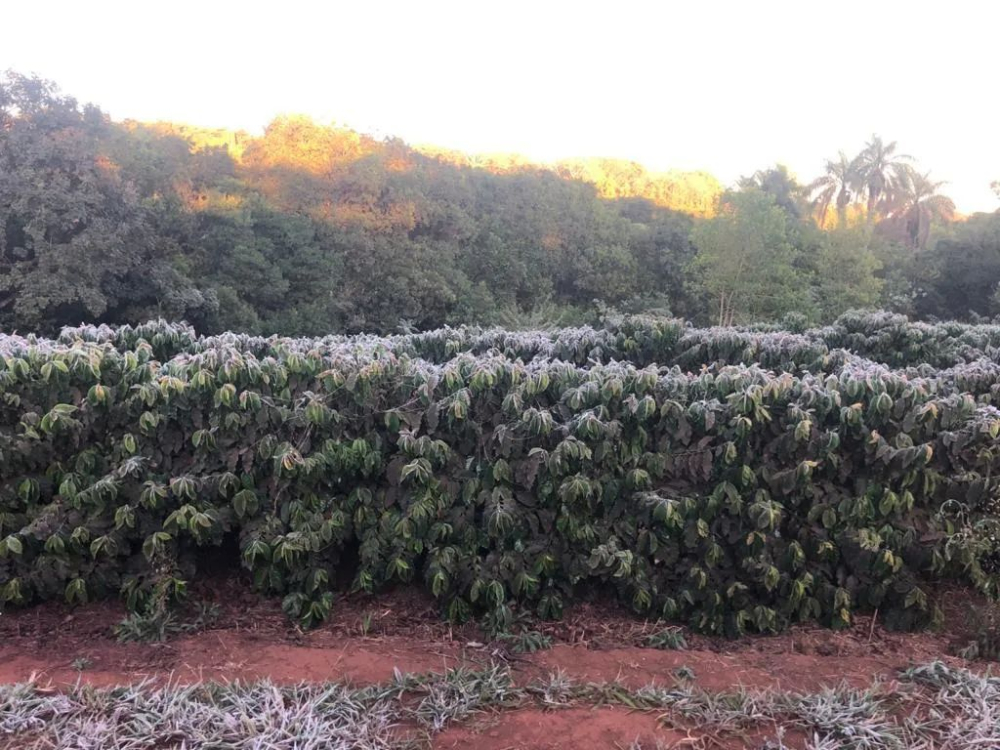
Extreme weather will not only bring uncertainty to Brazil's Arabica coffee production this year and next, but also affect coffee stocks on the ICE exchange, thus affecting the high trend of coffee futures prices.
In the annual report on Brazilian coffee released in June, USDA, the United States Department of Agriculture, said that the total production of Brazilian coffee beans (including Robusta) was expected to be 64.3 million bags (60kg/ bags) in the 2022 / 23 quarter, but the actual situation may be much lower than expected.

According to a preliminary forecast by Brazilian state supply company (Conab) in May, the total production of Brazilian coffee 2022 ampoule 23 in the production season was 53.4 million bags (60kg/ bags), of which Arabica coffee produced about 35.7 million bags (60kg/ bags). Local coffee farmers also say this year's Arabica coffee harvest is less than half of what it was in previous bumper years.
In addition, the US National Oceanic and Atmospheric Administration issued a forecast in early May that the main Arabica coffee growing areas in southern Brazil will have three days of frost in late May, which will not only affect the formed / ripe fruit, but also damage the coffee tree itself and affect the subsequent flowering and fruiting. As a result, the price of Arabica coffee futures on the ICE exchange has risen 7.47 per cent to 219.2 cents per pound since mid-May.
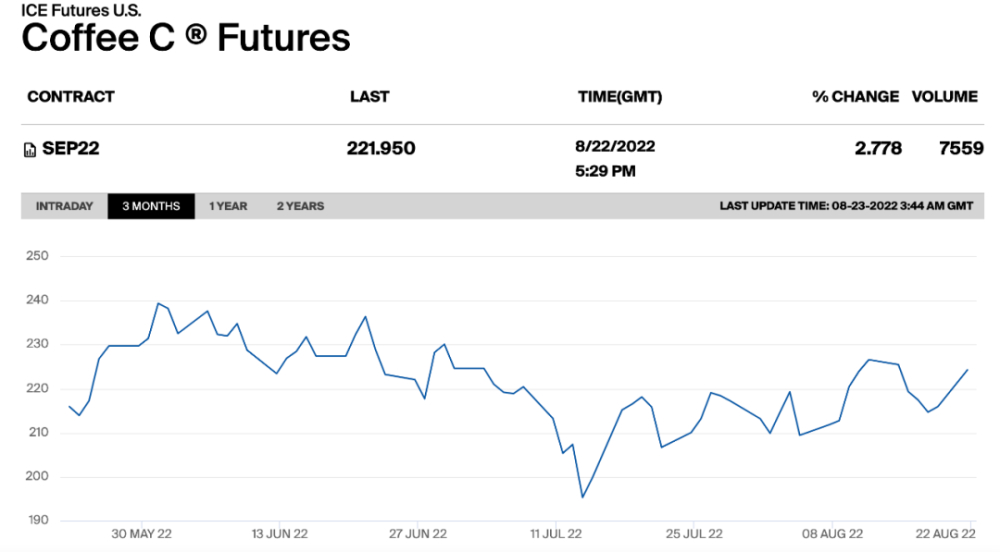
But the end result is that the frost is not expected to have a serious impact, although the price of coffee futures fell somewhat in the later period, falling below 200 cents per pound on July 14, and the spot price of coffee in western Brazil even hit a nine-month low in July, but the price of coffee rose again because the late harvest was not optimistic.
In the face of this situation, the ICE Exchange of the United States is preparing to re-rate and certify a batch of Brazilian Arabica coffee beans (270000 bags, 60kg/ bags) and trade them to deal with the current shortage of certified coffee stocks.
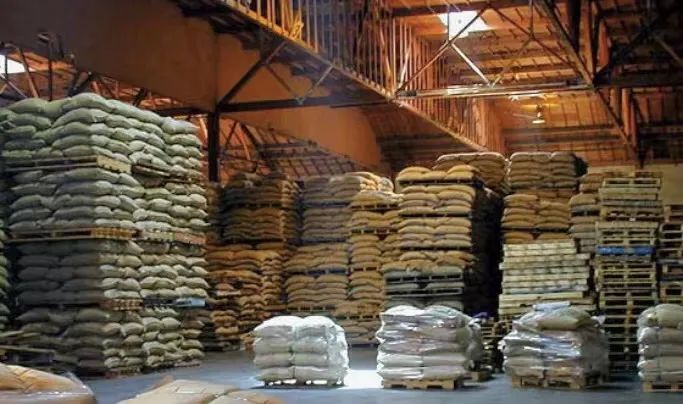
According to Reuters, the re-certified Arabica coffee was delivered by Brazil to the ICE Exchange between November 2020 and May 2015, but for a variety of reasons, the beans were not included in the exchange-certified coffee stock, which was already on a downward trend.
Since August 8th of this year, ICE's daily report shows that there are thousands of bags of coffee waiting to be graded into ICE certified coffee stocks. Until August 16, ICE daily report shows that 263259 bags (60kg/ bags) are waiting to be graded into ICE certified coffee stocks. However, ICE did not say in its report whether the quantity to be graded had been previously certified.
After passing the certification, these aged beans can not only alleviate the shortage of inventory, but also alleviate the high price of coffee futures. Although this move is not illegal, because ICE only has requirements on the quality of certified coffee, not on the harvest year of coffee beans. But the move has raised questions from many coffee traders about ICE-certified coffee, fearing a mixed deal between the new season and old beans.
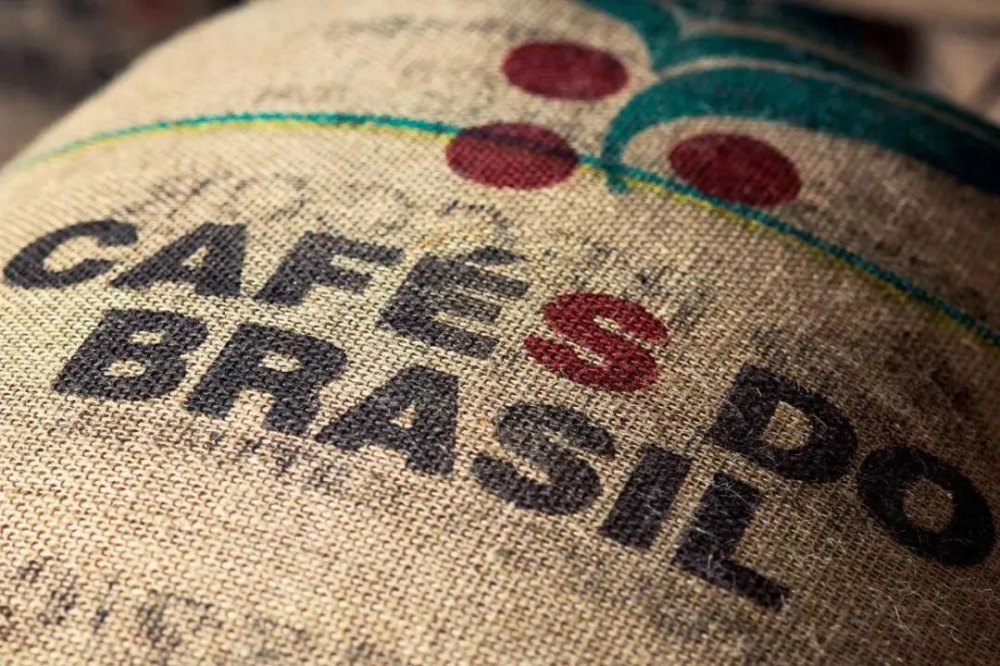
When traders take out these long-stored coffee beans, they are usually sold directly to roasters, but they will also make a lower profit if they do so.
If these coffee beans can be re-certified by ICE and enter the warehouse, it can not only supplement the quantity of coffee certified by the exchange and alleviate the problem of high futures prices, but also traders can follow the futures prices and offer discounts to different degrees according to the length of time to sell, so as to get more profits than selling directly to the roaster.
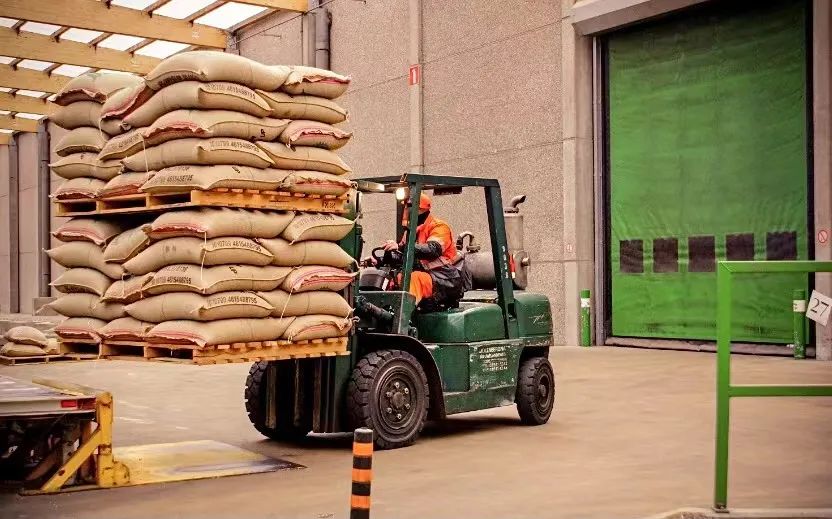
But for such actions, some market analysts believe that even if traders will take out these coffee beans and sell them on the market, they will eventually be returned to the exchange because there are not enough buyers.
On the other hand, such actions by the exchange also mean that the quality of coffee beans corresponding to futures prices will decline in the future, so that more traders will worry about exchange-certified coffee beans, and the trading volume will be reduced, eventually causing coffee futures prices to fall.
Photo Source: Internet
Important Notice :
前街咖啡 FrontStreet Coffee has moved to new addredd:
FrontStreet Coffee Address: 315,Donghua East Road,GuangZhou
Tel:020 38364473
- Prev

"me! I drink iced American coffee all the year round! " And then this guy...
Although the Beginning of Autumn has already passed, the high temperature above 40 degrees Celsius is still used in some places to remind us: what are you excited about? Summer is not over yet! Sichuan and Chongqing have issued a high temperature warning for many days in a row, with a bunch of fresh and juicy grapes drying into a bunch of raisins at temperatures of more than 40 degrees in Sichuan. In order to avoid
- Next

Luckily, under the price of metaphysics, some people "order in the style of acting".
Luckin Coffee was able to make a successful turnaround and become the leader of China's coffee market, and every cup Luckin Coffee made a modest contribution to it. Luckin Coffee used to be the price of a glass of ice city lemonade. New users have a free drink, and the second one has a "fracture". It was revealed that financial fraud was successful after several turns.
Related
- Unexpected! Ruixing Telunsu lattes use a smoothie machine to foam milk?!
- % Arabia's first store in Henan opens into the village?! Netizen: Thought it was P's
- Does an authentic standard mocha coffee recipe use chocolate sauce or powder? Mocha Latte/Dirty Coffee/Salty Mocha Coffee Recipe Share!
- What is the difference between Vietnam egg coffee and Norway egg coffee? Hand-brewed single product coffee filter paper filter cloth filter flat solution!
- What is the difference between sun-cured and honey-treated coffee? What are the differences in the flavor characteristics of sun-honey coffee?
- How to make Italian latte! How much milk does a standard latte use/what should the ratio of coffee to milk be?
- How to make butter American/butter latte/butter Dirty coffee? Is hand-brewed coffee good with butter?
- Is Dirty the cold version of Australian White? What is the difference between dirty coffee/decent coffee and Australian white espresso?
- Relationship between brewing time and coffee extraction parameters How to make the brewing time fall to 2 minutes?
- Got entangled?! Lucky opens a new store, Mixue Ice City, and pursues it as a neighbor!

